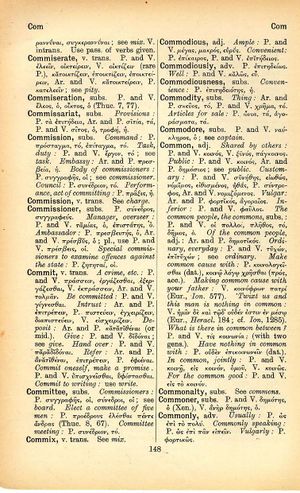common: Difference between revisions
πέτρην κοιλαίνει ρανὶς ὕδατος ἐνδελεχείῃ → constant dropping wears away a stone, constant dripping will wear away the hardest stone, little strokes fell big oaks, constant dripping wears the stone, constant dropping wears the stone, constant dripping will wear away a stone
(Woodhouse 2) |
(CSV3) |
||
| Line 1: | Line 1: | ||
{{ | {{Woodhouse1 | ||
| | |Text=[[File:woodhouse_148.jpg|thumb|link={{filepath:woodhouse_148.jpg}}]]'''adj.''' | ||
<b class="b2">Shared by others</b>: P. and V. [[κοινός]], V. [[ξυνός]], [[πάγκοινος]]. | |||
<b class="b2">Public</b>: P. and V. [[κοινός]], Ar. and P. [[δημόσιος]]; see [[public]]. | |||
<b class="b2">Customary</b>: P. and V. [[συνήθης]], εἰωθώς, [[νόμιμος]], εἰθισμένος, [[ἠθάς]], P. [[σύντροφος]], Ar. and V. νομιζόμενος. | |||
<b class="b2">Vulgar</b>: Ar. and P. [[φορτικός]], [[ἀγοραῖος]]. | |||
<b class="b2">Inferior</b>: P. and V. [[φαῦλος]]. | |||
<b class="b2">The common people, the commons</b>, subs.: P. and V. οἱ πολλοί, [[πλῆθος]], τό, [[δῆμος]], ὁ. | |||
<b class="b2">Of the common people</b>, adj.: Ar. and P. [[δημοτικός]]. | |||
<b class="b2">Ordinary, everyday</b>: P. and V. τυχών, ἐπίτυχών; see [[ordinary]]. | |||
<b class="b2">Make common causewith</b>: P. κοινολογεῖσθαι (dat.), κοινῷ λόγῳ χρῆσθαι ([[πρός]], acc.). | |||
<b class="b2">Making common causewith your father</b>: V. [[κοινόφρων]] πατρί (Eur., <b class="b2">Ion.</b> 577). | |||
<b class="b2">'Twixt us and this man is nothing in common</b>: V. ἡμῖν δὲ καὶ τῷδʼ οὐδέν ἐστιν ἐν μέσῳ (Eur., ''Heracl.'' 184; cf. <b class="b2">Ion</b>, 1285). | |||
<b class="b2">What is there in common between?</b> P. and V. τίς [[κοινωνία]]; (<b class="b2">with two gens.</b>). | |||
<b class="b2">Have nothing in common with</b>: P. οὐδὲν ἐπικοινωνεῖν (dat.). | |||
<b class="b2">In common, jointly</b>: P. and V. κοινῇ, εἰς κοινόν, [[ὁμοῦ]], V. κοινῶς. | |||
<b class="b2">For the common good</b>: P. and V. εἰς τὸ κοινόν. | |||
}} | }} | ||
Revision as of 09:25, 21 July 2017
English > Greek (Woodhouse)
adj.
Shared by others: P. and V. κοινός, V. ξυνός, πάγκοινος.
Public: P. and V. κοινός, Ar. and P. δημόσιος; see public.
Customary: P. and V. συνήθης, εἰωθώς, νόμιμος, εἰθισμένος, ἠθάς, P. σύντροφος, Ar. and V. νομιζόμενος.
Vulgar: Ar. and P. φορτικός, ἀγοραῖος.
Inferior: P. and V. φαῦλος.
The common people, the commons, subs.: P. and V. οἱ πολλοί, πλῆθος, τό, δῆμος, ὁ.
Of the common people, adj.: Ar. and P. δημοτικός.
Ordinary, everyday: P. and V. τυχών, ἐπίτυχών; see ordinary.
Make common causewith: P. κοινολογεῖσθαι (dat.), κοινῷ λόγῳ χρῆσθαι (πρός, acc.).
Making common causewith your father: V. κοινόφρων πατρί (Eur., Ion. 577).
'Twixt us and this man is nothing in common: V. ἡμῖν δὲ καὶ τῷδʼ οὐδέν ἐστιν ἐν μέσῳ (Eur., Heracl. 184; cf. Ion, 1285).
What is there in common between? P. and V. τίς κοινωνία; (with two gens.).
Have nothing in common with: P. οὐδὲν ἐπικοινωνεῖν (dat.).
In common, jointly: P. and V. κοινῇ, εἰς κοινόν, ὁμοῦ, V. κοινῶς.
For the common good: P. and V. εἰς τὸ κοινόν.

